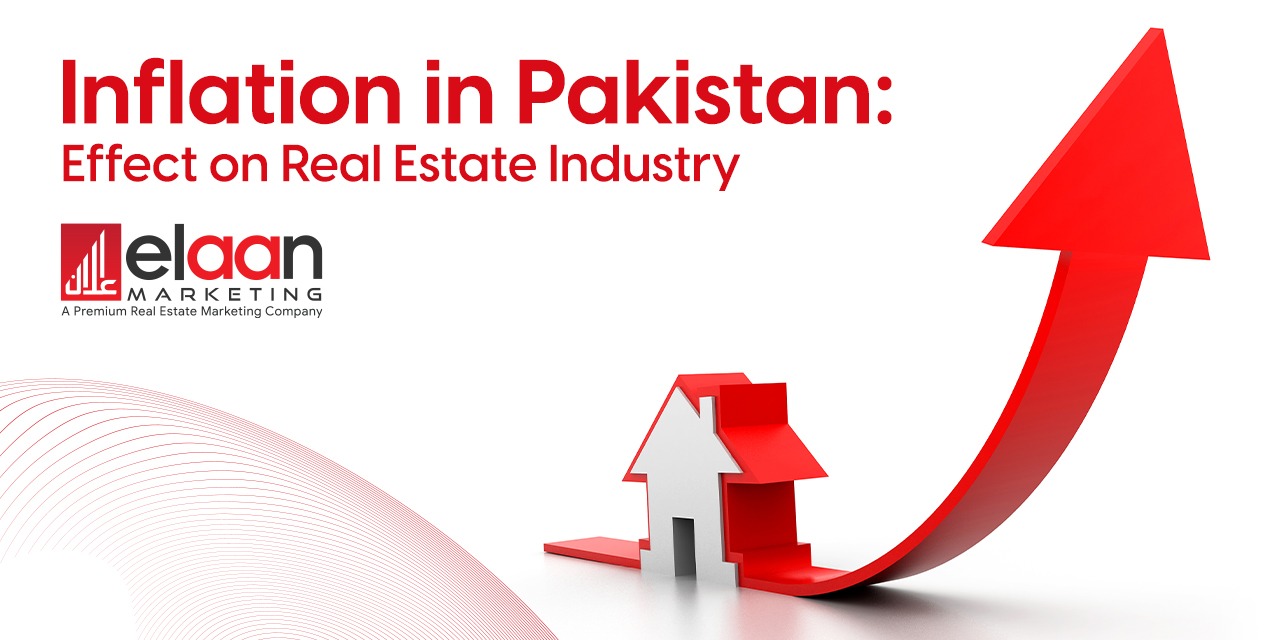Inflation in Pakistan; Effect On Real Estate Industry
Like every other industry, the real estate market also gets wrapped in the effects of change in the country’s economy, both good and bad. With the inflation percentage increasing, the real estate industry of Pakistan has been impacted by a scarcity of housing along with rising prices.
The real estate market, predominantly, gains an advantage due to the citizen’s tendency to seek out assets that act as a safeguard for their money during this type of inflationary climate.
However, even in real estate, there are both advantages and disadvantages of inflation. In this blog, Elaan Marketing will provide an overview of what inflation is and how it can impact the real estate industry both positively and negatively.
Understanding Inflation
Inflation begins when there is an undeniable rise in commodity prices along with raising price figures for everything else from basic necessities to luxuries. With the prices going up, the purchasing power of citizens declines.
When a country is hit with inflation, the people’s money starts losing value, which directly impacts a person’s spending ability. With this understanding, inflation can be defined as the rate of increase in the prices of services and necessities over a period of time.
But how do you find the right project? Why not start by looking at some of the best Pakistani investments this year.
What Causes Inflation?
The world’s annual inflation rate has reached new peaks ever since the inflation rate of 1981, which was the highest recorded rate in history. There are multiple reasons that aided the inflation to increase but the two major reasons that participated the most were global conflicts which included disputes and wars such as the war in Ukraine. The other reason for this is the global supply chain disruptions.
Over the course of this year, inflation is predicted by the International Monetary Fund (IMF) to average 11.5% in developing nations and 7.5% in wealthy nations.
Reasons for Inflation in Pakistan
The reasons for increasing inflation in Pakistan are a little different than global reasons. The factor of the balance of payment (BOP) crisis played the main role in the sudden spike in inflation.
The government tried to overcome the crisis by seeking help from the IMF. To worsen things further, the IMF didn’t lend a hand to the government which further fed the fire of inflation throughout the country.
As a last resort, the government had to increase utility prices including electricity and fuel in an attempt to manage the balance of payment but the sudden increase in prices left many industries under the effect of inflation.
Effects Of Inflation On Real Estate
In contrast to other industries, real estate is often affected positively by inflation. Real estate investors have historically been unaffected by increasing inflation; in fact, they stand to gain the most from it.
People with lesser incomes are particularly affected by the era of high inflation.
Since real estate offers better security than other assets like stocks or gold, etc. during periods of high inflation, most investors utilize it as a buffer against that inflation.
The effects of inflation on real estate can be both positive and negative. While investors stand to benefit from the inflation, people who are merely residing in rented properties or trying to get their own houses or properties built can face cost troubles against acquiring materials or hiring labor for construction.
This blog will discuss the positive and negative effects of inflation on the real estate market.
Positive Effects Of Inflation On Real Estate
Rising rental property rates are perhaps favorable during periods of high inflation. Buyers continue to rent because they have less purchasing power.
Rising rental property rates are perhaps favorable during periods of high inflation. Buyers continue to rent because they have less purchasing power.
Rental increase
Rental rates often rise in unison with growing inflation, much like the pricing of other commodities. Due to a decline in people's purchasing capacity, there is a rise in demand for rental houses.
Property owners with rental revenue are able to cover the rise in costs regardless of the value of the currency or the rate of inflation.
When rent prices go up, the owners of rental properties get an edge by rental income since people can’t afford to buy homes in an inflationary environment. The property owners get an advantage over battling inflation through increasing rents for their tenants.
Appreciation of property
The value of the properties has increased significantly over the past several years, according to data on real estate. For instance, a house purchased in 2019 may have a financial value of twice or thrice as much as the price when it was bought.
Any real estate investment would have easily outperformed inflation if we assumed this rise in the property's value and compare it to inflation rates.
When investing in real estate, you must be cautious since you don't want to leave money in properties that might not provide higher returns. It is crucial to remember that real estate investing does not function well in the near term since it takes time for a property's value to increase.
If you want to make money over the long term, you must hold onto the properties you invested in for a while.
Negative Effects Of Inflation On Real Estate
Another drawback is rising building material costs for new dwellings. New construction can be a highly challenging investment during an inflationary period due to the high cost of borrowing and the increased expense of construction.
There are a few reasons discussed below as to how inflation can impact the real estate market during inflation.
Increase In Cost of Borrowing
The increasing cost of borrowing is one of the potential drawbacks for a real estate investor in an inflationary environment. The banks impose higher interest rates and limit the number of loans they provide in order to prevent the bank from being shorted.
Due to the high cost of financing and the increasing cost of construction, new construction can be a very difficult investment during an inflationary period.
Increase In cost of construction
When inflation hits, it tends to affect every revenue-generating industry. This basically translates to the costs of all construction materials along with labor costs going up in the real estate sector. The prices of materials like steel, bricks, cement, etc. increase with inflation causing a sharp rise in the cost of construction of a house or any property for that matter.
Real Estate Forecast In The Upcoming Years
Over the past few years, the real estate market has experienced quick changes as well as ups and downs. Government-imposed regulations and policies, as well as changes in the political and economic climate, have all had an impact on people's property cases.
While real estate has grown, there have also been many significant obstacles, fragmented regulatory frameworks, a severe lack of affordable housing, slow uptake of technology, a loss of transparency, and a lack of resiliency.
More than a hundred industries are directly and indirectly related to Pakistan's fastest-growing sector, real estate. Along with the development business, other industries will grow due to the real estate boom. For local and international investors looking for a place to locate their interests, it is the best investment option.







